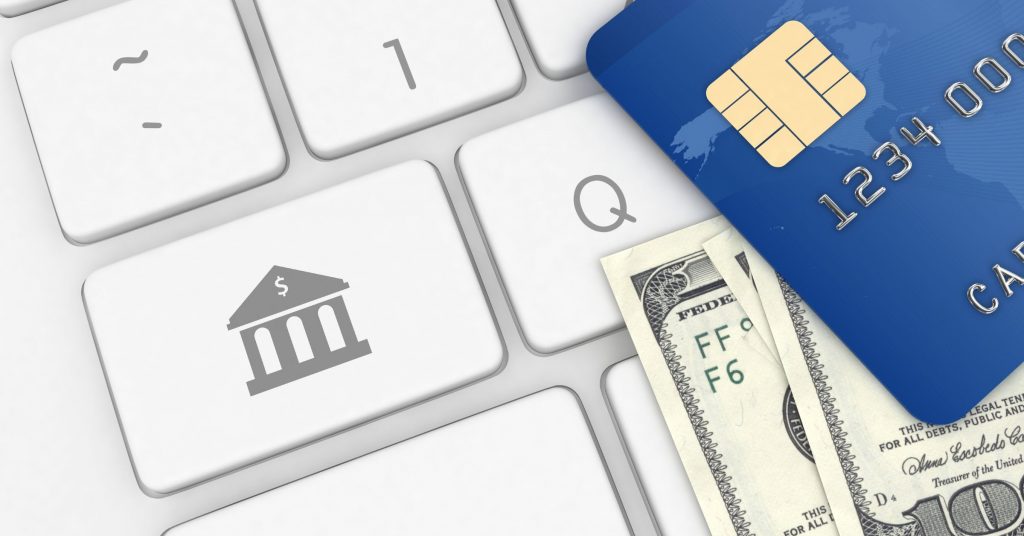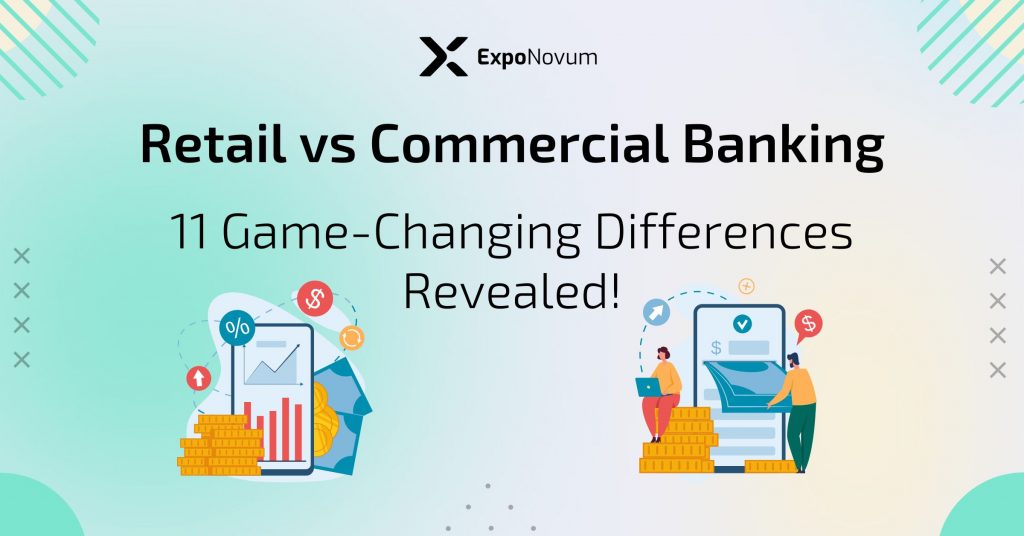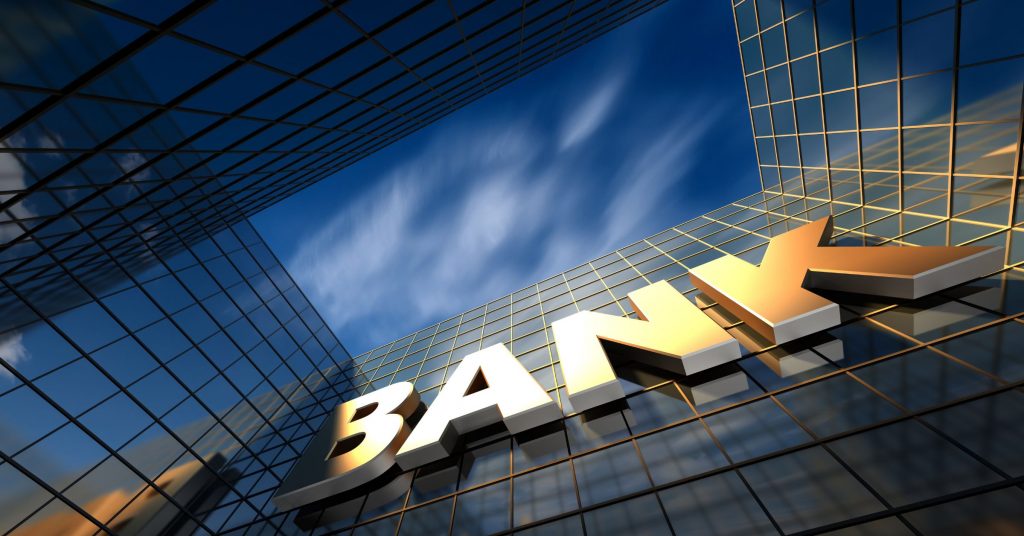The banking sector, often seen as the backbone of an economy, has evolved over the years to cater to the diverse needs of individuals, businesses, and governments. But have you ever wondered about the differences between retail and commercial banking? Why is it essential to understand these differences? Let’s dive deep into the world of banking to unravel these mysteries.

Retail Banking: An In-depth Look
What is Retail Banking?
Retail banking, often referred to as personal banking, is the face of banking for most of us. It’s the local branch you visit to deposit your paycheck, the ATM you use to withdraw cash, or the mobile app you log into to check your account balance. In essence, retail banking focuses on providing financial services directly to individuals.
Role of Retail Banks in the economy
Imagine a world without retail banks. Where would you save your money? How would you apply for a loan to buy your dream home? Retail banks play a pivotal role in the economy by promoting financial inclusion. They act as intermediaries, channeling funds from savers to borrowers, thereby facilitating economic activities and growth.
Key Services Offered
- Checking and savings accounts: The most basic services, allowing individuals to deposit, save, and withdraw money.
- Debit and credit cards: Providing the convenience of cashless transactions, be it for online shopping or at a physical store.
- Mortgages: Helping individuals realize their dream of owning a home.
- Personal loans: From buying a car to funding a vacation, personal loans cater to various needs.
- Services tailored to consumers and small businesses: Including specialized savings schemes, insurance products, and investment advice.
Benefits of Retail Banking
Financial inclusion and support for economic growth
Retail banks play a crucial role in bringing financial services to the masses. By offering a variety of products tailored to different segments of the population, they ensure that everyone, from the urban elite to the rural poor, has access to banking services. This inclusivity not only promotes individual financial well-being but also drives economic growth.
Essential financial services for individuals and small businesses
From helping young couples buy their first home to supporting small businesses with loans, retail banks touch our lives in myriad ways. They enable individuals to save, invest, and access credit, acting as catalysts for personal and community growth.

Commercial (Corporate) Banking: A Detailed Analysis
What is Commercial Banking?
While retail banking focuses on individuals, commercial banking, often termed as corporate banking, caters to businesses, both large and small. Think of it as the backbone for businesses, providing them with the financial tools and resources they need to operate, expand, and thrive.
Role of Commercial Banks in the Business Sector
Imagine a thriving city with bustling businesses, from the small corner cafe to the large manufacturing plant. What’s common between them? The need for financial services. Commercial banks step in here, offering a range of services from business loans to treasury and cash management. They play a pivotal role in ensuring businesses have the liquidity to operate and the resources to grow.
More from banking:
Corporate Banking Definition: A Comprehensive Guide For 2023
Corporate Banking vs Commercial Banking: Which One is The Right Solution for Your Business?
13 Advantages of Having an IBAN for Your Financial Needs
IBAN vs SWIFT: 7 Key Differences You Must Know
Key Services Offered
- Business Checking and Savings Accounts: Tailored for business needs, these accounts offer features like higher transaction limits and specialized business debit/credit cards.
- Lines of Credit and Business Loans: Whether it’s to meet short-term cash flow needs or fund a new factory, commercial banks provide businesses with the capital they require.
- Foreign Exchange Services: For businesses operating internationally, commercial banks offer services to handle multiple currencies, hedging, and forex trading.
- Wealth Management Services: Catering to businesses and high-net-worth individuals, these services include investment advice, asset management, and trust services.
Benefits of Commercial Banking
Stabilizing the Economy by Managing Risk
Commercial banks play a crucial role in risk management. By providing businesses with the tools to hedge against various risks, be it interest rate fluctuations or currency movements, they ensure economic stability.
Facilitating Business Expansion, Job Creation, and Economic Growth
Every successful business expansion or new startup funded means more jobs and a boost to the economy. Commercial banks are at the heart of this, providing the necessary capital and financial services.

Retail Vs Commercial Banking: The Key Differences
Navigating the world of banking can sometimes feel like deciphering a complex puzzle. But fear not! Let’s break down the primary distinctions between retail and commercial banking to give you a clearer picture.
#1 Target Audience
Retail Banks: Cater primarily to individual consumers. Whether you’re a student opening your first bank account or a retiree managing your savings, retail banks have got you covered.
Commercial Banks: Their main clientele are businesses, ranging from small startups to multinational corporations. If a company needs to manage its finances, it turns to a commercial bank.
#2 Range of Services
Retail Banks:
- Personal loans, mortgages, and credit cards
- Personal savings and checking accounts
- Investment services like mutual funds and retirement accounts
Commercial Banks:
- Business loans and credit lines
- Treasury and cash management services
- Merchant services and trade financing
#3 Economic Impact
Retail Banks: By serving individuals, they promote financial literacy, savings, and investment at the grassroots level. This, in turn, fosters economic stability and growth.
Commercial Banks: They play a pivotal role in business expansion, job creation, and fostering innovation. Their services ensure that businesses have the resources to operate efficiently and contribute to the broader economy.
#4 Account Structures
Retail Banking: Typically offers straightforward account structures such as savings, current, or fixed deposits. These accounts are designed for individual use and have features like ATM access, mobile banking, and personal checkbooks.
Commercial Banking: Provides more complex account structures tailored to business needs, like merchant accounts, payroll accounts, and escrow accounts. These accounts often come with features like bulk payment facilities and trade finance services.
#5 Loan Approval Process:
Retail Banking: The loan approval process is generally standardized, based on credit scores, personal income, and other individual financial metrics.
Commercial Banking: The process is more intricate, requiring a detailed analysis of business financial statements, cash flows, business plans, and market conditions.
#6 Relationship Management:
Retail Banking: While relationship managers exist in retail banking, the emphasis is on serving a large volume of customers, often through digital platforms or call centers.
Commercial Banking: Relationship management is paramount. Dedicated managers work closely with businesses, understanding their unique needs, and offering tailored solutions.
#7 Pricing and Fees:
Retail Banking: Pricing is often standardized, with set fees for services like account maintenance, ATM withdrawals, or fund transfers.
Commercial Banking: Pricing can be more flexible and is often negotiated based on the business’s size, transaction volumes, and the range of services they utilize.
Read more:
Breaking Barriers: How Alternative Payment Methods Are Reshaping E-commerce in 2023
Contactless Payments: The Definitive Guide 2023 [Advantages & Disadvantages]

#8 Duration of Services:
- Retail Banking: Services like personal loans or mortgages have fixed terms, often spanning years.
- Commercial Banking: Offers short-term financing solutions like working capital loans or trade credits, which might last only a few months.
#9 Financial Products Complexity:
- Retail Banking: Financial products are designed for simplicity and ease of understanding for the general public.
- Commercial Banking: Offers more complex financial instruments, such as derivatives, hedging solutions, and structured finance products.
#10 Regulatory Oversight:
- Retail Banking: Given its direct impact on consumers, retail banking often faces stringent regulations, especially concerning transparency, fees, and customer protection.
- Commercial Banking: While also heavily regulated, the focus is more on risk management, business ethics, and ensuring the stability of the broader financial system.
#11 Collateral Requirements:
- Retail Banking: Collaterals for loans can include personal assets like homes, cars, or fixed deposits.
- Commercial Banking: Businesses might pledge assets like machinery, inventory, accounts receivables, or even intellectual property as collateral.

The Future of Banking: Trends and Predictions
As we stand at the crossroads of technological advancements and changing consumer behaviors, the banking sector is poised for transformative changes. Let’s explore what the future holds for both retail and commercial banking.
Digital Transformation
- Online-Only Banks: With the rise of digital-only banks, or ‘neobanks’, customers can now access banking services without ever stepping into a physical branch. These banks offer competitive rates, user-friendly interfaces, and 24/7 services.
- AI and Machine Learning: From personalized banking suggestions to fraud detection, AI is revolutionizing how banks operate and interact with customers.
Sustainability and Ethical Banking
- Green Financing: As global awareness about climate change grows, banks are offering green loans and sustainable investment options, promoting environmentally-friendly projects.
- Ethical Banking: Banks are increasingly focusing on ethical practices, ensuring their operations and investments align with global sustainability goals and ethical standards.
Personalized Banking Experience
- Tailored Financial Products: Using data analytics, banks can now offer products tailored to individual customer needs, be it a specific type of loan or a unique investment opportunity.
- Financial Wellness Platforms: Beyond traditional banking, institutions are offering platforms to help customers manage their finances, plan for the future, and achieve financial wellness.
Challenges and Opportunities in Commercial Banking
- Globalization: As businesses expand globally, commercial banks need to offer services that cater to international needs, from multi-currency accounts to global trade financing.
- Regulatory Changes: With changing global economic landscapes, commercial banks must navigate a complex web of regulations, ensuring compliance while serving their customers efficiently.
Innovations in Payment Systems
- Cryptocurrencies: While still a topic of debate, cryptocurrencies like Bitcoin and Ethereum offer a glimpse into a potential future of decentralized banking and peer-to-peer transactions.
- Contactless Payments: The rise of NFC (Near Field Communication) technology has made transactions quicker and more convenient, with just a tap of a card or phone.
Cybersecurity in Banking
- Enhanced Security Protocols: As cyber threats evolve, banks are investing heavily in advanced security measures, from biometric authentication to blockchain-based systems.
- Customer Education: Banks are taking proactive steps to educate customers about potential threats and safe online banking practices.

The Evolving Landscape of the Banking Sector
The banking sector, much like the world around it, is in a state of constant flux. As we look to the horizon, several key trends and developments emerge:
- Digital Revolution: The rise of digital-only banks, AI-driven services, and advanced online platforms is reshaping the banking experience. The future bank might not be a physical place you visit but a seamless digital service integrated into your daily life.
- Sustainability and Ethical Practices: As global challenges like climate change take center stage, banks are aligning their operations and investments with sustainable and ethical practices. Green financing, ethical investments, and a focus on corporate social responsibility will become standard.
- Globalization and Diversification: As businesses operate on a global scale, banks will need to offer diverse services catering to international needs. This global approach will also mean navigating complex regulatory landscapes and understanding varied market dynamics.
- Customer-Centric Approach: Personalized banking, tailored financial products, and a focus on financial education and wellness will drive the future of banking. Institutions that prioritize customer needs and experiences will lead the way.
- Security and Trust: With increasing digitalization comes the challenge of cybersecurity. Banks of the future will invest heavily in advanced security measures, ensuring customer trust and the safety of assets.
Conclusion
In essence, the future of banking is a synthesis of technological advancements, ethical practices, and a deep-rooted commitment to serving the community. While challenges lie ahead, the opportunities for innovation, growth, and positive impact are boundless.
In wrapping up, our journey through the world of retail and commercial banking has been enlightening. From understanding the foundational differences to glimpsing the future, we’ve traversed a landscape rich in history, innovation, and potential. As the world of finance continues to evolve, one thing remains constant: the pivotal role of banks in weaving the fabric of our economic and social tapestry.
Revolutionize Your Banking with ExpoNovum: The Future is Here!
Step into the next generation of banking with ExpoNovum. Seamless, secure, and sophisticated – it’s everything you’ve been waiting for. Apply for free today!